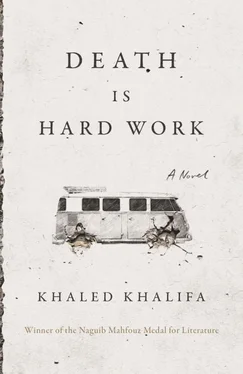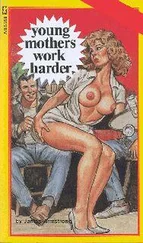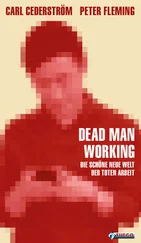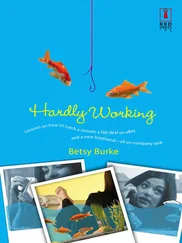Hussein began to take the matter seriously when three dogs began to hurl themselves at the windshield in frenzied concert. He started the engine, but the dogs didn’t budge. The bus pulled away, and Fatima tried to cover the rear window to block their view, until Bolbol told her that it was the smell that had attracted the dogs when he’d opened the door. How and where would they flee? They chose a road that Hussein guessed would lead them back to the main route to Aleppo, leaving the junction for Raqqa behind them. Bolbol asked, “Why don’t we go to Raqqa, and from there to Turkey? We could cross back over at Bab al-Salamah, near to Anabiya?” Hussein sneered at this bright idea, asking how they were going to get a body across the border without a passport.
The dogs were still chasing them. They were driving along a narrow road without any signposts, feeling well beyond lost. Hussein grumbled when Bolbol kept offering suggestions—for example, that they admit defeat for the time being and head back to the junction where they had stopped for the night, arguing that eventually the dogs would get bored and leave them alone. Bolbol saw Hussein scowling in the rearview mirror. It was far too late for them to be having any more adventures; a mistake at this point might cost them their lives.
It was still raining. They reached a junction with an old track that led through deserted fields to a distant village, drowning in darkness. Yes, they had no idea where they were. The dogs had fallen behind, but their distant barking wasn’t exactly reassuring. The siblings were more than apprehensive. They were lost in the wilderness.
Hussein resolved to act on his own initiative, deaf to all entreaties. Fatima begged him to eat a morsel of the bread they still had, and he didn’t reply. He sank down in his seat and stared at the rain, subsiding at times and intensifying at others. It would take perhaps ten minutes to reach the village, and being somewhere inhabited was preferable to staying in this wasteland. The dogs would inevitably come back; they knew their way to the prey, and unlike the siblings, they had noses that kept them from getting lost.
Bolbol recalled aloud how, in recent months, stray dogs had migrated from the towns surrounding Damascus to skulk in the city. They were not much like dogs anymore; their eyes were wolflike, and their jaws hung slack. Exhausted and not content with bones, they gnawed at the corpses that were too numerous for anyone to bury, especially after the larger battles. These dogs were no rumor but an established fact, confirmed by many. On the few occasions when he had gone out at night on some errand or other, Bolbol himself had seen them eating human flesh and wandering around the streets with a total lack of concern. Meeting a dog at night was horrifying now; it could be the end of you. When a dog’s ferocity and hunger cause it to lose its gentleness, it will never again be content with merely barking. These dogs had tasted human flesh, and they couldn’t forget it.
Hussein wasn’t listening. He turned off the engine and began to smoke, reflecting on their ongoing disaster. These small unknown roads would get them even more lost. He was completely turned around. Suddenly, he told Bolbol that he was the one who had involved them all in this mess, and he had to take responsibility for it. If they didn’t reach Anabiya by the afternoon, he would leave his siblings and the body by the roadside. He added that his father didn’t deserve all this attention anyway; he had turned Hussein out of the house and never cared about him again. His voice was level and calm as he glared at Bolbol in the mirror. Bolbol surprised him by saying, “Why not just leave us now.”
Hussein turned to his brother and then opened the side door of the bus and tried to drag the corpse outside on his own. While he worked, he made sure to say some horrible things to Fatima, who could still do nothing but cry. This labyrinth wasn’t the place to settle scores, but Hussein was determined to throw the body out into the open air. Bolbol got out and was drenched by the rain within minutes, but he retained his self-possession. A strange force had sprouted in his heart, and he felt capable of murder. Yes, for the first time, he felt as though murder might, after all, be the best way to rid oneself of old grudges. He even caught himself thinking that either he or his brother would have to die: that neither Hussein nor he would ever feel safe so long as the other was alive.
Hussein’s rage gave him strength. He held out against Fatima’s pleading—she had thrown herself back on the bus’s floor to kiss the feet of both brothers and was begging them to calm down. She spoke about the family, their father, their relationship, and their poverty, appealing to their noble-mindedness before she choked up entirely. Hussein cursed her and called her a whore, kicked her, and drove her out of the bus, where she fell to the ground. The sight of her, floundering in the mud, crying and unable to get up, was too much for Bolbol. He rushed at Hussein, grabbed him by the collar, and hauled him into the rain. The body, which Hussein had been trying to push and pull outside, fell over again, and their father’s face got stuck in the narrow space between seats. Bolbol pushed Hussein onto the ground and kicked him, hard. He was crying now, too, and couldn’t stop. Hussein got up and attacked Bolbol like a wild animal. He was solidly built and still fairly well muscled. The brothers struggled and fought for a few minutes before Hussein pinned Bolbol to the ground and punched him enough times to make Bolbol surrender. He let himself lie limp on the muddy ground, watching the overcast sky. He reflected that if his brother did manage to disappear, Hussein could at last distance himself from his childhood and invent the one he’d always wanted. And if Bolbol made it abroad and began a new life, he would be rid of his burdens forever.
The rain and the mud caused his body to lose all sensation. He licked the blood streaming down his face. He heard Hussein sobbing. Now all three siblings were crying. Bolbol wanted to get up but couldn’t. With Fatima’s help, he managed it after a few more tries. She led him back to the minibus, and Hussein followed them in silence. He started the engine and headed for the nearby village, still in total darkness.
The rain stopped, and the sky began to clear. When they reached the village, they realized it had been abandoned after some catastrophe. The houses were completely destroyed, obviously from aerial bombardment. The remains of furniture were strewn over the muddy roads. Everything was rubble. They proceeded slowly, seeking out anyone who might help them. The village had been small in any case, no more than forty houses lining a narrow paved road with a few other streets leading to a small square. Hussein stopped in this square and left the engine running. He honked the horn a few times in case anyone might still be around, but there was nothing here but desolation. Fatima mopped at Bolbol’s wounds with her sweater, still crying silently. Hussein got out to explore. He didn’t want to stay with the others; whatever little had remained between them was gone.
They had thought they would have a long time to talk during the journey. It would have been an appropriate occasion for reminiscence; after all, during his life, their father had only been able to gather his children on just such passing occasions, when a sense of duty, rather than desire, had been sufficient to corral them into the same place. Their father wouldn’t hear of the seriousness of the rift between them, which grew daily, but this journey with his body hadn’t offered either the time or the opportunity to voice their resentments of things that might have seemed small but, after many years, loomed large. Indeed, it had been a surprise to realize that it was four years since they had gathered together on any pretext at all, even for a special occasion. The general climate in the country gave them all an excuse. Families no longer braved checkpoints for gatherings. But the years before the revolution had been no better; none of them knew that they had all secretly wished to leave the family for good.
Читать дальше












